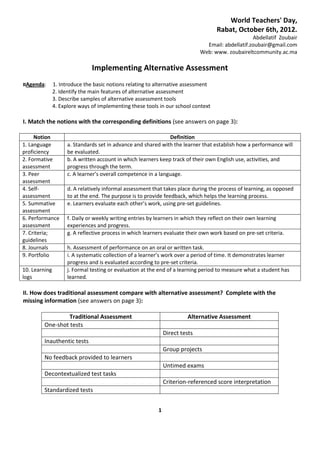
Alternativeassessmentteachersdayrabtoct12zoubair
- 1. World Teachers' Day, Rabat, October 6th, 2012. Abdellatif Zoubair Email: abdellatif.zoubair@gmail.com Web: www. zoubaireltcommunity.ac.ma Implementing Alternative Assessment ¤Agenda: 1. Introduce the basic notions relating to alternative assessment 2. Identify the main features of alternative assessment 3. Describe samples of alternative assessment tools 4. Explore ways of implementing these tools in our school context I. Match the notions with the corresponding definitions (see answers on page 3): Notion Definition 1. Language a. Standards set in advance and shared with the learner that establish how a performance will proficiency be evaluated. 2. Formative b. A written account in which learners keep track of their own English use, activities, and assessment progress through the term. 3. Peer c. A learner’s overall competence in a language. assessment 4. Self- d. A relatively informal assessment that takes place during the process of learning, as opposed assessment to at the end. The purpose is to provide feedback, which helps the learning process. 5. Summative e. Learners evaluate each other’s work, using pre-set guidelines. assessment 6. Performance f. Daily or weekly writing entries by learners in which they reflect on their own learning assessment experiences and progress. 7. Criteria; g. A reflective process in which learners evaluate their own work based on pre-set criteria. guidelines 8. Journals h. Assessment of performance on an oral or written task. 9. Portfolio i. A systematic collection of a learner’s work over a period of time. It demonstrates learner progress and is evaluated according to pre-set criteria. 10. Learning j. Formal testing or evaluation at the end of a learning period to measure what a student has logs learned. II. How does traditional assessment compare with alternative assessment? Complete with the missing information (see answers on page 3): Traditional Assessment Alternative Assessment One-shot tests Direct tests Inauthentic tests Group projects No feedback provided to learners Untimed exams Decontextualized test tasks Criterion-referenced score interpretation Standardized tests 1
- 2. III. Watch the video on 'Alternative Assessment' and: (N.B. The videos and the whole manual –highly recommended- are all available online free of charge. See Opp-Beckman, L. and Klinghammer, S. J. 2006 in the bibliography below) a. Identify the main features of Alternative Assessment: (possible answers) -Learners use language for real purposes -They can demonstrate what they have learnt -They feel more motivated and are eager to take responsibility for their own learning -They have the opportunity to display and show their progress to peers or family b. Describe each of the four kinds of alternative assessment tools: (possible answers) -Self-record keeping: learners keep track of their assignments or completed projects -Peer feedback and assessment: learners give feedback on each other's work -Portfolios: students use binders to collect their written productions -Performance assessment: students could give oral presentations or perform drama scenes c. Explain the teacher's and learner's roles: (possible answers) -Teachers: provide clear guidelines for tasks, set parameters, act as timekeepers and serve as resource persons. -Learners: should keep on task, work quietly and courteously with partners and ask for help whenever needed. d. Provide samples of evaluation criteria: (possible answers) -How well students prepare for the presentation -Feedback on specific language skills -Quality of delivery: clarity, loudness, eye contact and body language. IV. In pairs, discuss how you could implement the tools above in your school context. Share your ideas with the group. ¤REFERENCES: Brown, H., Douglas. 2004. Language Assessment: Principles and Classroom Practices. Pearson Education. Coombe, Christine and Nancy Hubley. 2003. Assessment Practices. TESOL Case Studies Series. TESOL Publications. Opp-Beckman, L. and Klinghammer, S. J. 2006., Shaping the way we teach English: Successful practices around the world (Instructor’s manual), Office of English Language Programs, Washington, DC, USA Richards, Jack C. & Scmidt, R. 2010. Dictionary of Language Teaching and Applied Linguistics. Longman. 2
- 3. A. Answers to task one: Source: Shaping the Way We Teach English: Successful Practices around the World, 2006. A. Answer to task 2: Traditional Assessment .B Alternative Assessment One-shot tests Continuous, longitudinal assessment Indirect tests Direct tests Inauthentic tests Authentic assessment Individual projects Group projects No feedback provided to learners Feedback provided to learners Timed exams Untimed exams Decontextualized test tasks Contextualized test tasks Norm-referenced score interpretation Criterion-referenced score interpretation Standardized tests Classroom-based tests Source: Assessment Practices. TESOL Case Studies Series. TESOL Publications, 2003. 3
